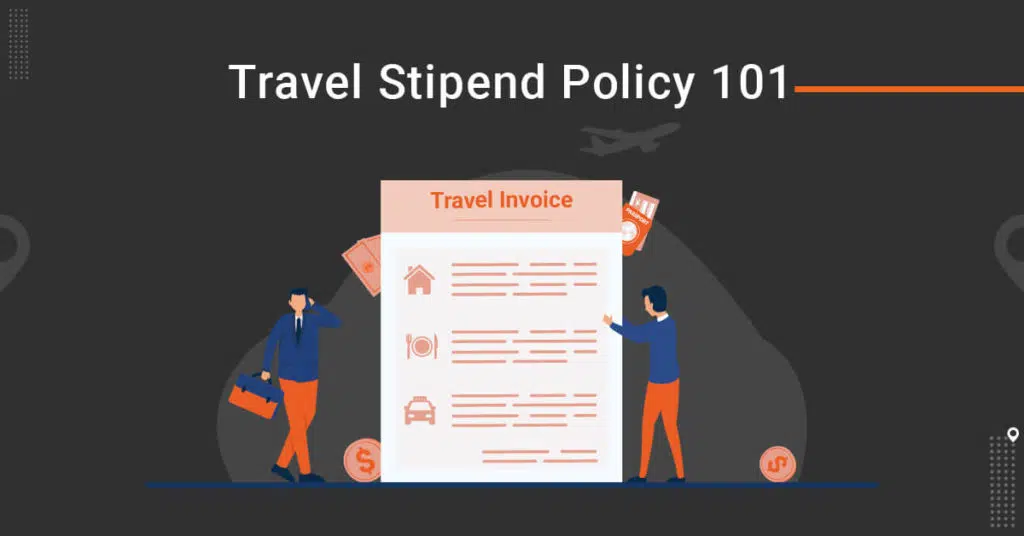
Employee burnouts are common these days due to the work-from-home scenario. According to a recent report, 44% of employees have serious concerns about their physical, mental, and social health. Therefore, encouraging employees to take paid time off work has become essential, especially during these times. And one of the best ways for employees to recharge themselves and feel motivated is personal travel.
It could be that you already have a paid leave policy or support bleisure (business + leisure) travel, but providing your employees with a travel stipend would encourage them to go on personal trips, without worrying about finances. On the other hand, it will help you increase employee engagement and retain talent. In this blog, we will share with you what is travel stipend policy, what to include in a travel stipend policy, its benefits, and tax laws. Read on.
Travel Stipend & Travel Stipend Policy Explained
A travel stipend, also called a vacation stipend, is an allotment of funds (generally a fixed amount) to employees that they can use in each calendar year for their personal travel expenses. It does not cover all expenses of the employee’s travel but eases their burden with the contribution of some amount.
A travel stipend policy outlines the rules for employees on how to use the stipend for personal travel expenses. It lays down the process by which the company provides stipend i.e. advance or reimbursement. Also, it suggests if any receipts or photos are required to substantiate the expenses.
No federal or state laws mandate employers to offer a travel stipend to their employees. Therefore, companies can set a travel stipend policy of their own will ( and budget), to enhance employee benefits and employee experience. For instance, a startup may not feel comfortable having a travel stipend policy at all due to its constrained budget.
Benefits of Offering Travel Stipend to Employees
Apart from employee engagement, there are many benefits of offering travel stipends to employees. Here are some ways how doing so can be beneficial for your company:
- Increased job satisfaction – Travel stipend appeals to employees as it is not a standard offering. The employees feel motivated and satisfied to continue with their job role knowing that the company just doesn’t worry about its work but also their overall health and development.
- Increased productivity – Engaged employees are more efficient and produce high-quality work. They are aligned with the team and business goals and accountable for their contribution and performance.
- Higher talent retention – If you want to build a high-performing team, you need your employees to stick around. Offering employees a travel stipend to spend their vacations is a huge benefit to offer for retaining talent. Employees who have benefitted from and have been accustomed to this benefit are less likely to leave your company.
- Have fewer sick days/leaves taken – Another benefit of providing a travel stipend? Motivated employees hardly miss office or work. Not only do they show up every day, but they also work with full excitement and enthusiasm. On the other contrary, you may notice demotivated employees taking many leaves, or being disengaged even while working.
- Reduction in healthcare benefit usage – By keeping your employees engaged with work and giving them the necessary (travel) break, when needed, helps them in leading a healthy life. Usually, people who take a break are at a lower risk of mental health issues such as anxiety, stress, and depression.
What does a Travel Stipend Policy Include?
There are no rules on what to include or not include in your travel stipend policy. Whether you want to fund the entire transport or just the accommodation, it’s totally up to you and your company’s budget. A few common expenses that a travel stipend policy can cover are:
- Passport/Visa fee
- Per diem rates
- Fuel expenses
- Meal expenses
- Transport expenses – airline tickets, train tickets, car rentals,
- Hotel room allowance
- Prepaid phone card fee/International data plan
- Incidental expenses
- Expenses for events, leisure activities, etc.
- Tolls, parking in case of domestic travel
Apart from this, you’ll also need to define the process of offering travel stipends – Will you add it directly to their paycheck, or will employees have to file an expense reimbursement? Will employees have to provide receipts for each travel expense? Will you offer company credit cards?
In case you are reimbursing travel stipend, you will need to clearly state:
- The process of creating an expense report
- The minimum amount that would require a receipt
- The timelines for submitting the receipts post-travel
- The tool for filing reimbursement
- The approval flow
- How soon they can expect reimbursement
Are Travel Stipends Taxable?
Travel stipends are not regular income and therefore not taxable by the IRS (Internal Revenue Service). It can be taxable if the company goes for a non-accountable plan. In which case, employees will neither have to provide receipts of all travel expenses nor return the unused money.
The company may choose to cover the tax implications themselves or pass it on to their employees. But we suggest going with an accountable reimbursement plan which is non-taxable.
Automate Travel Stipend Reimbursements with ITILITE
Offering travel stipends to your employees talks a lot about your company’s culture. However, creating a travel stipend policy makes sure that all the rules for payments or reimbursement are clear.
If you are reimbursing travel stipends, then you can automate the entire process with integrated corporate travel management software such as ITILITE. ITILITE can help employees create expense reports within minutes and get reimbursements on time. To know more, get in touch with our product expert today.












